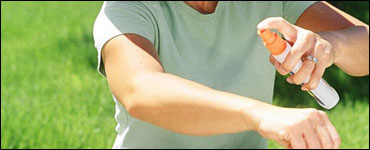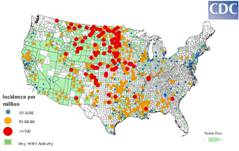CDC Features
Current Features
Who Cares about Mosquito Bites? We Do.

It can be scary to think about it (so often we don't), but a single mosquito bite can give you West Nile virus. And sure, many of the people who get bitten by an infected mosquito won't get sick. They're lucky.

Others aren't as lucky—More than 27,600 people in the US have been reported with West Nile virus disease since 1999, and of those 11,000 have been seriously ill and over 1,000 have died. The older you are, the more likely that you could get severely ill if you get infected. People who have diabetes and folks that have ever received an organ transplant are also at higher risk for severe disease. We don't know all the reasons one person becomes severely ill and another doesn't.
Sometimes you can't change your luck, but there is something you can do to improve your odds of avoiding West Nile virus.
You can use a repellent. Use it on your skin, when you go outside. And not just on you, but on family and friends too.
Insect Repellent: Who, What, When, Where and Why

We know all the reasons people don't use repellent—you forgot it, didn't want to go back and get it, you didn't want to get it on your hands, it's a little bit stinky, didn't buy it since groceries already cost enough, you're not sure if it's good for you, mosquitoes don't bite you….
There's a counter argument for every excuse, but here's the best reason to go ahead and get the repellent—you don't want to get sick from West Nile virus, and this is a part of the equation you can help to control. You don't want the weeks (or even months) of aches and fatigue that come with West Nile fever. You certainly don't want to be hospitalized with meningitis, encephalitis or a worse outcome.
Put a few bottles or packets of repellent around—in the car, by the door, in your bag. Make it easy. This is a chance to avoid thinking, "If only…."
What repellent should I use? CDC recommends a wide variety of repellents. There are those that can protect you for a short while in the backyard or a long while in the woods. From the ol' standby DEET to plant-based oil of lemon eucalyptus. Ever heard of picaridin or IR3535? Read on. You might be surprised and you can certainly find one you won't mind using. All repellents recommended by CDC have been registered with EPA and evaluated for efficacy and safety.
When should you wear repellent? Mosquitoes can bite anytime. Most of those that carry West Nile virus bite from around sundown to around sun-up (throughout the night). But use common sense—if you're being bitten, get out the repellent.
Where is West Nile virus a problem? Almost all of the continental US has had human WNV cases. Some areas, such as those with the red dots on the map to the left, have more cases of severe disease than other areas. How does your county look? Other areas of the US are affected by other viruses such as eastern equine encephalitis virus and LaCrosse encephalitis virus.
What about mosquito control in my town/county? It's a great idea. Integrated mosquito management helps reduce the number of mosquitoes, especially those that can carry disease. This is a crucial part of reducing the risk to humans. Mosquito control won't get rid of every last mosquito, but combined with repellent use you can markedly reduce the chances of getting bitten. If you don't have mosquito control in your area ask your city, why not?
For More Information
- Tell Mosquitoes to Buzz Off: Public Service Announcements
- Fight the Bite (
 3:11)
3:11)
- West Nile Virus: Still a Concern (2007) (
 4:55)
4:55)
- West Nile Virus Activity — United States, 2007 (MMWR, 4 July 2008:57(26);720-3)
- Updated Information regarding Insect Repellents
- US Environmental Protection Agency
- National Pesticide Information Center*
Page last updated: July 7, 2008
Content source: Division of Vector-borne Diseases, National Center for Zoonotic, Vector-Borne, and Enteric Diseases
Content owner: National Center for Health Marketing
URL for this page: www.cdc.gov/Features/MosquitoBites/
*Links to non-federal organizations are provided solely as a service to our users. These links do not constitute an endorsement of these organizations or their programs by CDC or the federal government, and none should be inferred. CDC is not responsible for the content of the individual organization Web pages found at these links.


